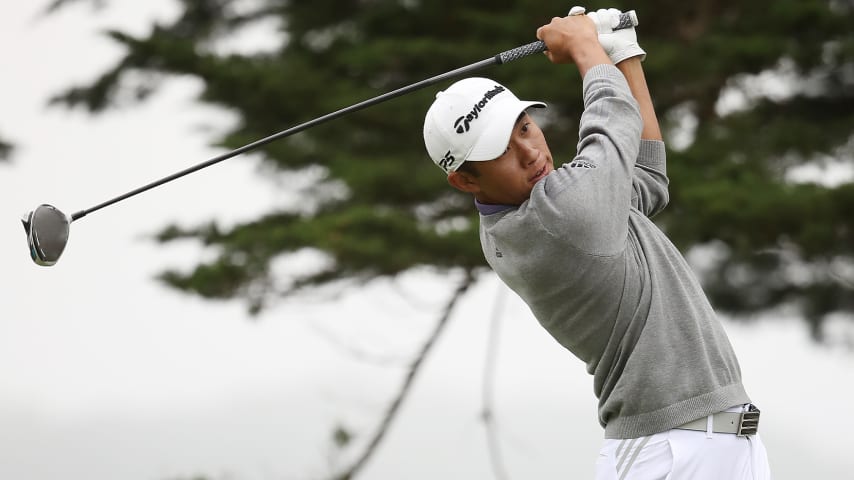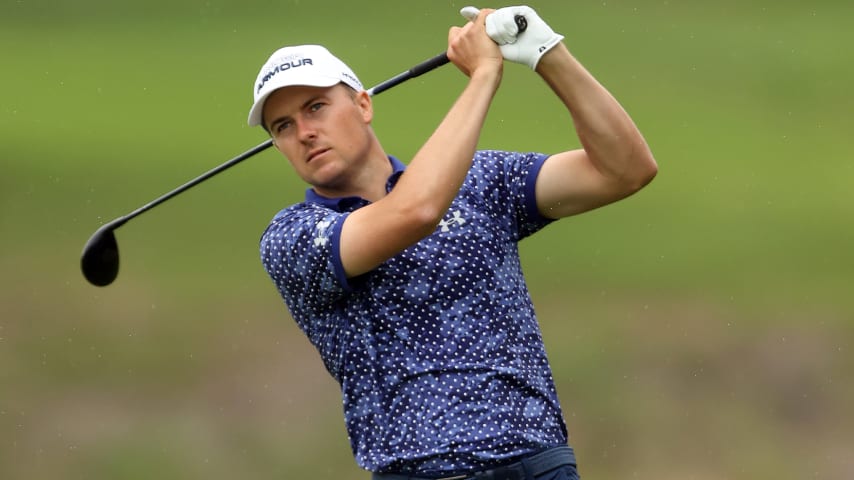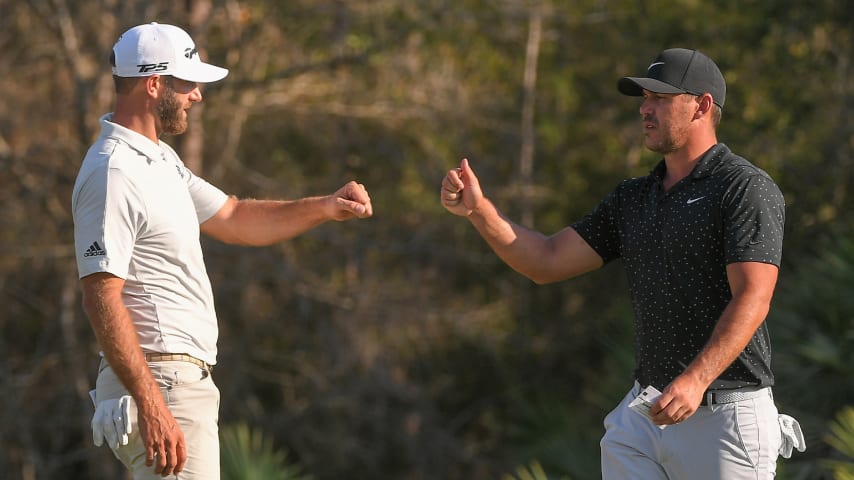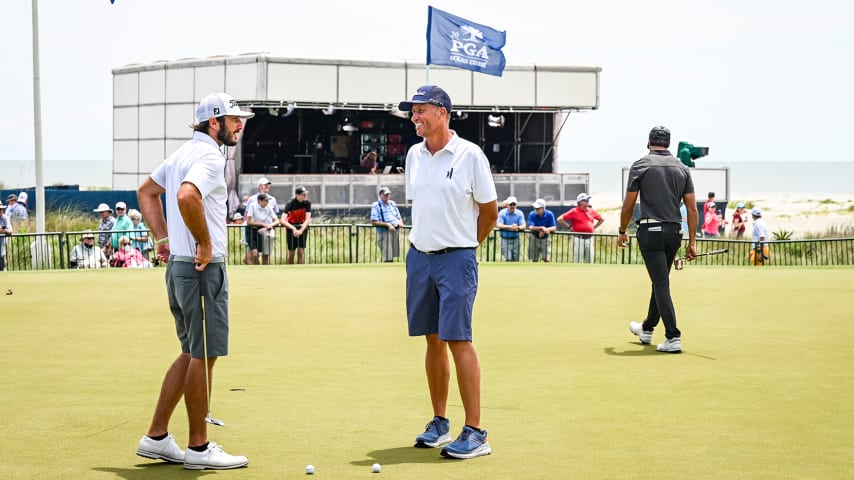Collin Morikawa’s shot heard ’round the world
7 Min Read

Epic drive to seven feet for eagle on 16 was an instant PGA Championship classic
Written by Cameron Morfit
Epic drive to seven feet for eagle on 16 was an instant PGA Championship classic

Collin Morikawa 293-yard tee shot to 7 feet on No. 16 at PGA Championship
Toptracer gave us the juicy details: 165 mph ball speed, 274 yards carry, 74 feet of curvature, left to right. The ball peeled around a stand of cypress trees down the right side, all but winking as it flew by; landed just shy of the green; and bounded up toward the pin, stopping 7 feet short.
What happened at the drivable 16th hole at TPC Harding Park changed everything: Collin Morikawa, in just his second major start, had seized control of a PGA Championship in which seven players were at one point tied for the lead. Watching from the tee, Cameron Champ, Morikawa’s playing partner, would liken it to a video-game shot – so flawless as to seem almost unreal.
It was late afternoon, and with no on-site fans, walking scorers and laser operators whooped and hollered in the damp, cool air. Morikawa flashed a quick smile at his caddie. The real-time odds swung dramatically in his favor. Paul Casey, playing in the group just ahead, looked back from the 17th tee and realized his chances had just taken a massive setback.
Here’s how it happened, according to those who were there.
All week, the 16th hole, the last good place to attack at TPC Harding Park, loomed as the potential turning point. And the fact that it was drivable – Justin Thomas hit it to 18 feet in Friday’s second round but missed the eagle putt – added intrigue.
Collin Morikawa: I wasn't planning on going for it at the beginning of the week, so I actually never even tried it.
Paul Casey (66, T2): It was wind dependent, flag dependent, tee dependent. It was always going to be a pivotal hole, one you feel like you should birdie, but there was also the possibility of screwing it up because of the penalty area on the left and the tree canopy on the right. There was plenty of danger on the last three holes, but 16 was your last real birdie opportunity.
Sue Epstein, walking scorer and former Stanford golfer: I had scored for Haotong Li when he shot 65 on Friday, and he hadn’t gone for it and made par. But Collin was hitting the driver so straight. (He would hit 39 of 56 fairways to finish No. 1 in driving accuracy.)
Kerry Haigh, PGA Chief Championships Officer: We had planned to make the 16th drivable for two of the four rounds and felt Sunday would be one of those if weather conditions allowed. It was obviously dependent upon the wind strength and direction. We reviewed the actual hole location for Sunday for a long time on both Friday and Saturday afternoons after play with the hope being to make it extremely appealing for players to attempt going for the green.
The new yardage presented a conundrum for big hitters like Dustin Johnson and Casey, playing up ahead of Morikawa. Nonetheless, each found a way to birdie the hole.
Casey: Driver was too much; it was a 3-wood hole for me. Left bunker, splashed it out to 4 feet with a really awkward putt with a really awkward hog’s back. Couldn’t tell which way it was going to go, called Johnny (McLaren, his caddie) in. I made it.
Dustin Johnson: I think I did hit driver Sunday, and just pulled it left. I couldn't get there with 3-wood, and driver was probably too much, so I was trying to kind of chip it and just pulled it.
Carl Woodland, volunteer ShotLink laser operator on 16: The day was cold, it was chilly, and this was toward the end of the day, so it was starting to get even cooler. We were 60 yards down the fairway, down the left side, and DJ went right over our heads and into the penalty area. But then he pitched in for birdie. We were still talking about that when Collin got to the tee.
Morikawa had game-planned for the hole playing more or less to its scorecard yardage (332). But with the tees moved up so far (it was now 294) the hole had changed drastically.
Morikawa: It was just something that -- everything fit, the circumstance, and made sense, wind and everything was perfect, and obviously it worked out.
Jakovac: He never hit driver there, not even in practice. We didn’t think the tee would be up as far as it was. They had it like 20 yards up from the back of the box, which made it 275-ish to the front. We thought it would be more like 290 front, but we got up there on Sunday and the tee was way up, and it was really a no-brainer because it was a perfect distance for him. The wind was in off the left so he could hit his normal cut off there to the left and let it feed to the right.
Epstein: When he pulled the driver, I was like, Wow, he’s going for it. I remember the contrast with Li two days earlier, and thinking it was absolutely the right call.
Earlier that summer, Morikawa had faced a similar shot at the par-4 14th hole at the Workday Championship at Muirfield Village. The shot called for his stock cut, and he drove the green, hitting it 12 feet. He missed the eagle putt, but went on to win the tournament in a playoff. Now at the PGA at Harding, having holed his pitch shot for birdie on 14, he was set up for even greater drama on 16.
Epstein: There wasn’t much discussion with his caddie. You could tell they were in agreement.
Champ (70, T10): That pin on 16, if you missed it, obviously you can miss it slightly left, but there's not much room right and if you miss there you're completely screwed.
Jakovac: It was just a matter of not having it fade too much and kick in that bunker.
Morikawa: When you look at what kind of driver or driver hole that is for me on 16 at Harding, like it was literally perfect, and it was just like made for me to hit a good shot there.
The shot came off like a thunderbolt that reverberated across the course. Frank Nobillo, on CBS, called it, “the shot of his life!” Golf Digest’s Shane Ryan, in a story after the PGA, sought to answer the question, “Was Collin Morikawa’s drive on 16 the greatest shot in PGA history?”
Champ: When it came off, my caddie, his caddie, we just looked at each other like, this is going to be pretty damned good, and of course it landed 3 feet short of the green, bounced perfectly straight right up there.
Jakovac: It just needed one straight first bounce, and it went up there perfect.
Casey: I turned around and saw his shot and where it finished. I was on the 17thtee. Hadn’t hit my tee shot yet. Two thoughts: Brilliant shot, and dammit. (Laughs) I always tip my cap to great golf, and of course there’s going to be a sense of thinking there’s still a chance, but that was one of the nails in the coffin right there, wasn’t it?
The PGA Championship returns to its May date at Kiawah Island this week, but over the last 10 months Morikawa’s epic shot has barely faded from memory.
Webb Simpson (72, T37): Could be the shot of the decade for the PGA Championship.
Epstein: My son is a huge golf fan, and he said, ‘Mom, were you there?’ ‘Yes, I was right there when he pulled driver!’ There was no roar, but you could hear people gasping.
Woodland: We had no depth perception, so it looked like it was going in the hole and had got to within six inches. We were sort of screaming at each other, like, ‘Whoa, he put it on the green!’
Champ: He pulled off the shot when he needed to the most, and I give him mad, mad props.
Jakovac: Under the circumstances it’s the best shot I’ve ever seen.
Morikawa: The actual club, it's just sitting in my house. Definitely haven't framed it. Just sitting in a bag with a bunch of other clubs. I know which one it is. … I'm sure down the road I'll kind of look at it and be like, That's kind of the shot that changed everything, that kind of changed my career at that point at 23.












